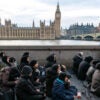Is the world becoming safer or more dangerous?
Few people would select the first option. It doesn’t take Russia launching air strikes in Syria (to cite only one recent example) for most to admit that tensions are rising.
So why in the world are we cutting defense spending?
And not by small amounts. The U.S. military—which is smaller today than it was on September 9, 2001—has had to contend with cuts amounting to more than $180 billion over the last four years. And there’s no relief in sight.
In fact, President Obama is preparing to veto a bipartisan bill that would increase the national defense budget by 6 percent. And all because he’s upset that it wouldn’t increase non-defense spending by the same amount.
Playing political games with national security is beyond the pale. Yet it’s happening.
Meanwhile, as defense expert Justin Johnson notes in a recent article, Iran is receiving $150 billion under the deal it recently forged with the Obama administration.
Because of U.S. and international sanctions, this money—which had been held in non-Iranian banks—wasn’t accessible to Iran. But that’s not the case anymore.
Sure, it won’t have the full amount to spend however it would like. The U.S. Treasury Department estimates that the regime will have about $50 billion left after it settles its debts. But that’s still a lot of money available for it to plow into its military.
And when you take into account the increased revenue that’s sure to come in as the country’s economy revives, it’s obvious that Iran’s military can only become stronger and better-equipped over the next few years.
“The contrast with the United States could not be more striking,” Johnson writes. “While the Iranians are flush with cash and increase spending on their military and terrorist proxies, the United States continues to dramatically cut our military spending.”
Among the results:
- The Army is cutting 40,000 soldiers.
- The Navy won’t have an aircraft carrier in the Middle East this fall for the first time in years.
- The Air Force has proposed cutting whole fleets of aircraft.
So why are we making such deep cuts, and why now? Blame the Budget Control Act (BCA). Signed into law by President Obama in 2011, it was designed to curb federal spending. A worthy goal, to be sure, but the BCA was a blunt instrument.
The BCA hardly touches what is causing federal spending to soar—entitlements such as Social Security, Medicare, and Medicaid. But it’s dealt a serious blow to the national security budget. And like a damaged vessel out at sea, it’s been taking on water ever since. Entitlements, meanwhile, are climbing with abandon.
True, the United States spends more on defense than Iran does. But we also have many more threats worldwide to deal with, so the amount is hardly unjustified. You can’t buy peace on the cheap.
“Russia has invaded Ukraine and is flexing its muscles elsewhere,” writes Johnson. “China is building islands and gutting our computer networks. North Korea shows signs of another space launch or perhaps a nuclear test. And Islamic terrorism is still a grave threat to the United States.”
Meanwhile, the refugee crisis in Europe continues, the Taliban is on the rise in Afghanistan, and Chinese hackers are mining our national secrets.
Is this the time to be holding our security hostage? So the Department of Housing and Urban Development can get an extra $6 billion? So the Department of Labor can get $1.3 billion more? To bag an additional $500 million for the Environmental Protection Agency, it’s necessary to make ourselves more vulnerable to attack?
We’ve been quietly transitioning from “peace through strength” to “peace through luck” for some time now. Let’s hope we can reverse course—before it’s too late.
Originally published in The Washington Times.
































